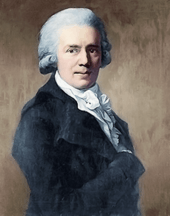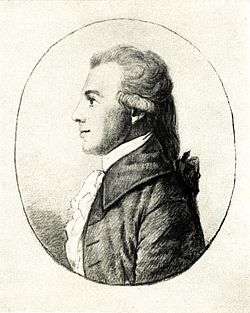Christian Gottfried Körner
Christian Gottfried Körner (2 July 1756, Leipzig – 13 May 1831, Berlin) was a German jurist. His home was a literary and musical salon, and he was a friend of Friedrich Schiller.

Biography
He studied law at the University of Göttingen and at the University of Leipzig. He got his degrees at Leipzig.[1] In 1783 he became chief councilor of the Lutheran Upper Consistory at Dresden; he was appointed to the office of judge in the Court of Appeals in 1790; and, in 1811, he returned to the appellate court.
His home in Dresden was an important center for culture and the arts. Riggs (1997) writes:
The Körner household in Dresden ... became a literary and musical salon. Plays and essays were read; Singspiele and chamber music were performed; and lectures on art were given. Guests and participants included Johann Gottfried von Herder, Goethe, Wilhelm von Humboldt, the Schlegel brothers, Ludwig Tieck, Novalis, and the musicians Johann Naumann, Johann Hiller, Karl Zelter, Mozart, and Weber.[2]
Körner went so far as to have a small theatre built in his home, at which his family and friends performed plays. A number of the plays of Friedrich Schiller, his close friend, received their private premieres in this theater.[3] He corresponded with Goethe. Schiller lived with him much of the time between 1785 and 1787.
Following the Battle of Leipzig in 1813, during the Russian occupation of Leipzig, he was Russian government counselor. In 1815 he was forced to leave his position in Dresden, having come into conflict with its ruler over the issue of collaboration with Napoleon. He found another position, however in the Prussian service 1815 at Berlin, where he was state councilor and later Privy Councilor in the new Ministry of Education.
Works
Among his works are the anonymous Aesthetische Ansichten (Leipzig, 1808), Versuche über Gegenstände der innern Stadtsverwaltung (Dresden, 1812), and Deutschlands Hoffnungen (Leipzig, 1813).[1] Of greater importance is Schillers Briefwechsel mit Körner ("Schiller's correspondence with Körner," edited by Karl Goedeke, Leipzig, 1874; by Ludwig Geiger, Stuttgart, 1895–96). He also prepared the first collected edition of Schiller's works (1812–15). He edited the works of his deceased son (Poetischer Nachlass Theodor Körners, 1815). His own collected works are edited by Adolf Stern (Leipzig, 1881).
Family

Körner married Minna Stock, the daughter of an engraver, in 1785, following the death of his father, who had been implacably opposed to the marriage on grounds of social class.[4] They lived, throughout their entire marriage, with the artist Dora Stock, Minna's older sister, with whom they were both close.
The Körners had two children who survived past infancy.[5] Both had short but high-achieving lives: Emma Körner (1788–1815), who became a skilled painter, and Theodor Körner (1791–1813), who became a renowned soldier-poet. Both died young: Theodor in 1813 as a casualty of war, and Emma of a sudden illness in 1815; the parents were devastated at their loss.[6]
Notes
- Rines, George Edwin, ed. (1920). . Encyclopedia Americana.
- Riggs (1997, 600)
- Siegel 1993, 49
- Siegel 1993, ch. 1
- Johann Edward, the first-born (24 July 1786) died at seven months; Siegel 1993, 23.
- Siegel 1991
References
- Riggs, Robert (1997) On the Representation of Character in Music: Christian Gottfried Körner's Aesthetics of Instrumental Music, The Musical Quarterly vol. 81, No. 4. (Winter, 1997), pp. 599–631.
- Siegel, Linda (1993) Dora Stock, portrait painter of the Körner circle in Dresden (1785–1815). Lewiston, N.Y. : E. Mellen Press.
- Gilman, D. C.; Peck, H. T.; Colby, F. M., eds. (1905). . New International Encyclopedia (1st ed.). New York: Dodd, Mead.
Further reading
| Wikimedia Commons has media related to Christian Gottfried Körner. |
- Jonas, Fritz: Briefwechsel Wilhelms von Humboldt mit Körner (Berlin, 1880)
- Jonas, Fritz: Körner, biographische Nachrichten über ihn und sein Haus (Berlin, 1882)
- Weber, Albrecht (ed.), Briefe der Familie Körner (1804–1815) in Deutsche Rundschau 4 (1878), no. 9 (June), pp. 461–479; no. 10 (July), pp. 115–136